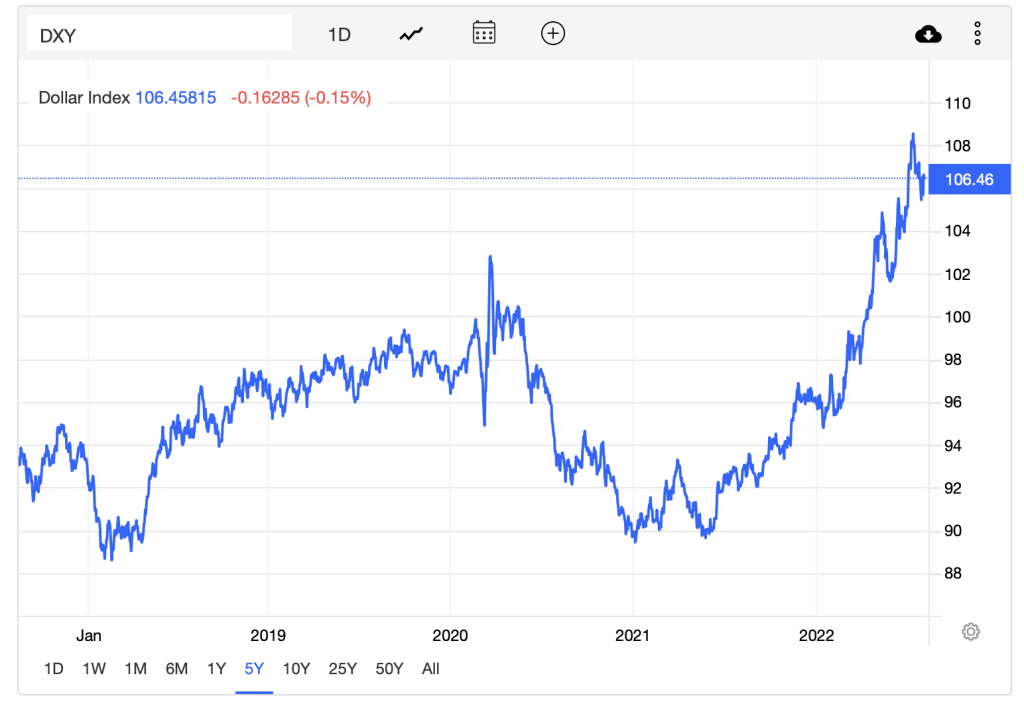Doesn’t time fly? It doesn’t seem that long ago since we were celebrating the New Years arrival. We hoped Omicron would herald, not the complete end of Covid 19, but at least a gradual return to normal as Covid becomes accepted as a virus on par with Influenza. This optimism was priced in to the stock markets of the world.
Everyone had plans to finally spend on the nice things in life that we had collectively been denied since early 2020. Unfortunately the gods of supply and demand were unmoved by our previous enforced deprivation. Too many people chasing too few goods and services sent prices through the roof. I guess I’m saying once the cages were opened, rampant inflation was sure to follow.
Rising inflation seemed to be an OK price to pay initially, but the increase in CPI was turbo-charged when China enforced a zero Covid policy – choking supply further and Putin with perfect calculation pushed his expansionist agenda and brought consumers further pain as energy prices rocketed. High inflation followed.
All of the above is history. What is amazing is we are 7 months further down the road now.
recession
As you can see this heading isn’t RECESSION! Not even Recession, just recession. A small friendly recession hardly worth noticing really. Certainly in the US at least, although technically (I won’t bore you with an explanation) they have entered recession, nobody, not even the President accepts this is like previous recessions. It is said a true recession is when a neighbour loses his job and a depression is when you lose yours. In the US there are still too many jobs chasing too few people. Last week’s US job report is still very strong. No signs of lay-offs and growing unemployment. Everywhere, and I’m going to include the UK in this, many businesses have signs in the window saying “We are Hiring”. Maybe it’s because of Brexit in the UK that we have a shortage of workers, but that doesn’t account for the rest of the developed world being short too.
Recession
In the UK we will likely enter a recession – the mainstream socialist media, especially the BBC, will be so annoyed if we don’t! There is a chance that our recession will be a softer one too. Like the American’s recession. Job loses could be minimal as there are still plenty jobs on offer here at the moment. Maybe that’s a positive from Brexit, but most likely a hangover from Covid where a generation of workers went AWOL and remain AWOL. YOLO indeed!
RECESSION
It looks like Southern Europe will likely be the epicentre of the coming storm, with perhaps Italy the first to crack under the weight of debt. Germany seem unable to help out the Mediterranean countries this time, as they did with Greece, as they are in a pickle themselves. Putin is playing the long game knowing the solidarity of European Unity will likely fall apart once the lights go out and voting citizens are left partially without heating.
A Bit Of History
Unbelievably stock-markets tend to do OK in recessions and in times of normal (not excessive) inflation. Markets look forward about 18 months and therefore front-run recessions. By the time a recession finally arrives, markets are already showing signs of life once again. An average recession seldom lasts for more than a couple of years. We are seven months into this year, about 10 months since we noticed a levelling off in general shares here in the UK. In the US the most speculative shares hit a peak around February of last year. Just recently they have begun to show some life!
Dollar Dominance
I know we live in the UK, but once again the answer to when share prices start to rise again lies in the US. If you are going to increase interest rates it is best to go first if you can. Andrew Bailey knows this (or at least his team at the Bank of England does). The UK base rate was first raised on 17th December, albeit by just 0.15%. In the US the first rate rise was on the 16th March. In Europe where their hands are tied the first rate rise arrived on 22nd July. Currency market traders had seen the rises coming long before even Jay Powell did. There is a measure called the Dollar Index and it has been on a tear for over 12 months. It measures the relative value of US dollars against a basket of other currencies of the developed world. The basket is 58% Euro, 13% Yen, 12% UK£, 9% Canadian $, 4% Swedish Krona and 4% Swiss franc.

In the last 12 months the Euro has depreciated against the Dollar by 20%! The UK£ has lost 12% and there is a reason. If you have a large chunk of cash to invest you follow the highest but safe, interest rates in the world. Where do you go?
It is clear that Europe has increasingly very limited options to raise interest rates due to the overpowering debt the south is under. The Germans who ultimately bank roll the EU debt, currently have an energy cost and procurement predicament so can’t step in if a member defaults under the strain of higher rates. The UK has its own currency and so it can raise rates further, offering a higher return on cash. But the US has the highest safe rates available now. The credit markets saw it coming and started to price the strength in early. As the cash floods in to find a home the dollar strengthens. A strong dollar does a couple of things.
- It doesn’t help US exports as they become more expensive – bad for US shares.
- Other share markets start to look cheap to the Americans, but have then progressively got cheaper as the dollar strengthens. Shares in Europe haven’t risen by the 20% currency depreciation to stand still. They have fallen. Convert that loss back in to dollars and the losses are huge. Shares in UK, Japan, Canada… none look attractive whilst the dollar continues its continual climb.
But Wait
Look at the chart above again. Did the tide just turn? Was July the peak, or is this just another pause as we saw at the end of March? Well it looks like the strength of the Dollar could have peaked to me, at a level we would expect it to peak. The credit markets haven’t yet priced in interest rates going as high as the FED has stated. Share prices have steadied since the dollar weakened slightly and riskier asset prices are improving ? It is a little too soon to say, but It’s certainly all to play for as we move towards the Autumn. An early indicator of a recovery would be “first to fall should be first to rise”.
In Summary
- For the riskiest of assets, fortunes turned turtle over 15 months ago now.
- Recently crypto currencies have raised a little off their very low floor.
- Riskier shares have out-performed safer shares over the last couple of months. (If you are interested the ratio of Staples to Discretionary shares).
- Oil is trading below $90 a barrel again in the US. Europe trading at $95 – down from its peak of $125
The tide does seem to be turning. Further interest rate rises are already baked in now, but the markets are looking beyond those already. Further rises should not crash the markets. It could be set up for a recovery sooner than many think.
Keep Your Head Up
- Forget the internal politics of the Conservative party.
- The petty trading squabbles still going on with our “European Friends”
- The on-coming winter Pan-European energy crisis (Lesley has bought plenty of candles and batteries as we remember the 70’s. Perhaps you should too).
- The socialist media agenda which suggests high-inflation is permanent, advocating we must raise everyone’s wages by double digits and whilst we are at it raise all benefits.
Look beyond all of above and the likelihood is:-
- Inflation is likely to peak higher than it is now. Remember that one of the tools the central bank use is words. The fight isn’t won yet, it makes sense for the central bankers to use alarmist statements in the hope it will help slow the spending down. It’s easier to talk inflation down than it is to increase interest rates. The elevated level of inflation will gradually decline back towards its annual 2% target .
- The first interest rate drops are expected to be next February in the US and March in the UK. Just as the rate of inflation climbed quickly, so should it fall quickly as the calculations are based on a twelve month rolling period.
- Share prices of good companies will recover – share prices of bad companies won’t.
Tell me what you think.


Afternoon Howard,
Interesting reading as always.
Look forward to seeing how things pan out over the coming months.
Every confidence that you are correct & with the new range of shares being selected am expecting better times ahead.
Regards Michael
thank you howard, i do not understand much of what you say but i put my trust in you a long time ago and have no reason to change.
irving